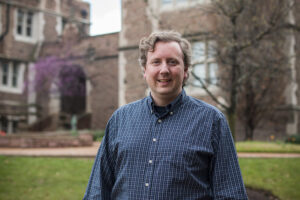
Jeffrey G. Catalano, professor of earth and planetary sciences at Washington University in St. Louis, is co-investigator of a new research collective that aims to replicate the cradle of life on planet Earth, research team members announced Feb. 14.
NASA’s Astrobiology Program has awarded a $9 million grant to tackle this effort through the Earth First Origins project, led by Rensselaer Polytechnic Institute (RPI). The five-year project seeks to uncover the conditions on early Earth that gave rise to life by identifying, replicating and exploring how prebiotic molecules and chemical pathways could have formed under realistic early Earth conditions.
In his Aqueous Geochemistry and Mineralogy Laboratory at Washington University, Catalano will create clay minerals and other materials that were abundant on Earth’s surface before the origin of life. Many of the Earth materials to be studied occur elsewhere in the solar system, including on planets and moons that have hosted liquid water, but cannot be found easily on Earth today because of the oxygen in the atmosphere. He will also lead the research team’s efforts to understand how simple biomolecules that were precursors to life interact with these materials.
“Using our group’s expertise in mineral-fluid reactions, I am trying to understand the types of materials present on the early Earth and how these solids may have catalyzed the development of complex organic compounds necessary for life,” Catalano said.
Catalano is the sole Washington University professor working on this multi-institution collaborative project, which involves 14 other scientists from around the United States. However, the Earth First Origins project has strong Washington University connections. Karyn Rogers, lead investigator of the project and assistant professor at RPI, earned her PhD in earth and planetary sciences at Washington University in 2006, and team member Tom McCollom, of the University of Colorado, earned his PhD from the same department in 1996.